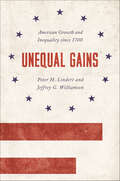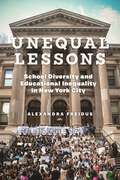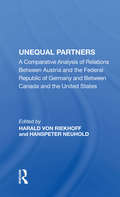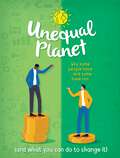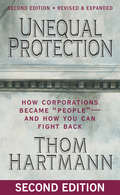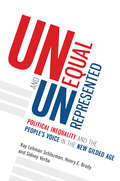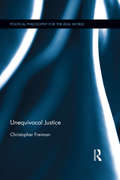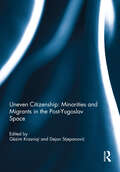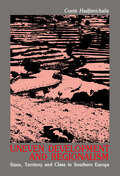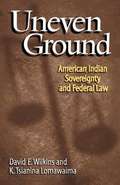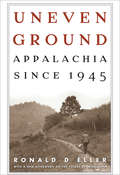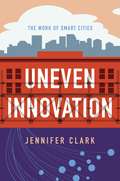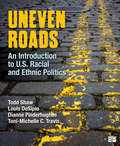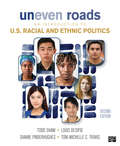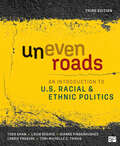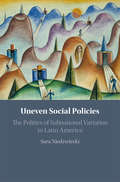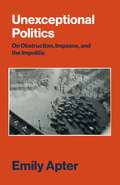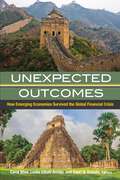- Table View
- List View
Unequal Gains: American Growth and Inequality since 1700 (The Princeton Economic History of the Western World #62)
by Jeffrey G. Williamson Peter H. LindertA book that rewrites the history of American prosperity and inequalityUnequal Gains offers a radically new understanding of the economic evolution of the United States, providing a complete picture of the uneven progress of America from colonial times to today.While other economic historians base their accounts on American wealth, Peter Lindert and Jeffrey Williamson focus instead on income—and the result is a bold reassessment of the American economic experience. America has been exceptional in its rising inequality after an egalitarian start, but not in its long-run growth.America had already achieved world income leadership by 1700, not just in the twentieth century as is commonly thought. Long before independence, American colonists enjoyed higher living standards than Britain—and America's income advantage today is no greater than it was three hundred years ago. But that advantage was lost during the Revolution, lost again during the Civil War, and lost a third time during the Great Depression, though it was regained after each crisis. In addition, Lindert and Williamson show how income inequality among Americans rose steeply in two great waves—from 1774 to 1860 and from the 1970s to today—rising more than in any other wealthy nation in the world. Unequal Gains also demonstrates how the widening income gaps have always touched every social group, from the richest to the poorest. The book sheds critical light on the forces that shaped American income history, and situates that history in a broad global context.Economic writing at its most stimulating, Unequal Gains provides a vitally needed perspective on who has benefited most from American growth, and why.
Unequal Lessons: School Diversity and Educational Inequality in New York City
by Alexandra FreidusDiversity and racial integration efforts are not sufficient to address educational inequalityNew York City schools are among the most segregated in the nation. Yet over seven decades after the Brown v. Board of Education decision, New Yorkers continue to argue about whether school segregation matters. Amid these debates, Alexandra Freidus dives deep into the roots of racial inequality in diversifying schools, asking how we can better understand both the opportunities and the limits of school diversity and integration.Unequal Lessons is based on six years of observations and interviews with children, parents, educators, and district policymakers about the stakes of racial diversity in New York City schools. The book examines what children learn from diversity, exploring both the costs and benefits of school integration. By drawing on students’ first-hand experiences, Freidus makes the case that although a focus on diversity offers many benefits to students, it often reinscribes, rather than diminishes, existing inequalities in school policy and practice. The idea of diversity for its own sake is frequently seen as the solution, with students of color presumed to benefit from their experiences with white students, while schools fail to address structural inequality. Though educators and advocates often focus on diversity out of a real desire to make a positive difference in students’ lives, this book makes clear the gaps between good intentions and educational injustice.
Unequal Partners: A Comparative Analysis Of Relations Between Austria And The Federal Republic Of Germany And Between Canada And The United States
by Harald Von RiekhoffThe subject of this book is the relationship between unequal partners in the international system. The chapters focus on two relationships between unequal partners - Austria and the Federal Republic of Germany on the one hand, and Canada and the United States on the other. By including not only the political and economic, but also the historical, cultural and communications aspect of the relationship, the authors broaden the scope of their analyses.
Unequal Planet: Why some people have - and some have not (and what you can do to change it)
by Anna ClaybourneUnequal Planet offers young readers a clear, insightful look at Earth's ongoing inequality crisis If everyone on Earth was equal, we would have the same standards of living, opportunities, wealth, health and other factors that make our lives different. But this isn't the case, the world is not an equal place and many experience great inequality in their lives. Unequal Planet looks at the reasons behind global inequality - from where people are born to their individual income to the impacts of climate change, and suggests some positive, practical solutions to this complex and challenging issue. It also explores what we can all do - at a global and an individual level - to help make the world a more equal and better place.Aimed at readers aged 9 and up.Contents:1: IT'S NOT FAIR! 2: WHAT IS MONEY? 3: WEALTH AND INCOME 4: RICH AND POOR COUNTRIES 5: NATURAL RESOURCES 6: LAND GRAB! 7: CASE STUDY: HAITI 8: DEALING WITH DEBT9: INVENTIONS AND TECHNOLOGY 10: CASE STUDY: NORWAY 11: INEQUALITY IN SOCIETY 12: MORE INEQUALITIES 13: CLIMATE CHANGE CRISIS 14: CASE STUDY: TORRES STRAIT ISLANDERS 15: CAN WE FIX IT? 16: INTERNATIONAL AID 17: EDUCATION AND KNOWLEDGE 18: CASE STUDY: EQUALITY FOR WOMEN 19: BIG IDEAS20: WHAT CAN YOU DO? 21: A FAIRER FUTURE?22: GLOSSARY 23: FURTHER READING 24: INDEX Titles in this series:Plastic PlanetHot PlanetRecycled PlanetSustainable PlanetExtinction PlanetPeaceful Planet
Unequal Political Participation Worldwide
by Aina GallegoHighly educated citizens vote at much lower rates than less educated citizens in some countries. By contrast, electoral participation exhibits no such bias in other countries as diverse as Spain, Denmark, and South Korea. This book describes the levels of unequal participation in thirty-six countries worldwide, examines possible causes of this phenomenon, and discusses its consequences. Aina Gallego illustrates how electoral procedures, party and media systems, unionization, and income inequality impact unequal participation through an original combination of cross-national survey data and survey experiments.
Unequal Protection: How Corporations Became ""People"" -- and How You Can Fight Back
by Thom HartmannNEW EDITION, REVISED AND UPDATED Unequal taxes, unequal accountability for crime, unequal influence, unequal control of the media, unequal access to natural resources—corporations have gained these privileges and more by exploiting their legal status as persons. How did something so illogical and unjust become the law of the land? Americans have been struggling with the role of corporations since before the birth of the republic. As Thom Hartmann shows, the Boston Tea Party was actually a protest against the British East India Company—the first modern corporation. Unequal Protection tells the astonishing story of how, after decades of sensible limits on corporate power, an offhand, off-the-record comment by a Supreme Court justice led to the Fourteenth Amendment—originally passed to grant basic rights to freed slaves—becoming the justification for granting corporations the same rights as human beings. And Hartmann proposes specific legal remedies that will finally put an end to the bizarre farce of corporate personhood. This new edition has been thoroughly updated and features Hartmann’s analysis of two recent Supreme Court cases, including Citizens United v. Federal Election Commission, which tossed out corporate campaign finance limits.
Unequal Protection: The Rise of Corporate Dominance and the Theft of Human Rights
by Thom HartmannFrom the book cover: Unequal taxes, unequal accountability for crime, unequal influence, unequal privacy, and unequal access to natural resources-these and other inequalities are the effects of corporations winning the rights of persons while simultaneously having the legal protections to avoid the responsibilities that come with these rights. The largest transnational corporations fill a role that has historically been filled by kings. They control most of the world's wealth and exert power over the lives of most of the world's citizens. Their CEOs are unapproachable and live lives of nearly unimaginable wealth and luxury. This new feudalism was not what our founders envisioned for America. Thom Hartmann tells the startling and intriguing story that will forever change our understanding of American history and how to get back to a government of, by, and for the people. He proposes specific legal remedies that could truly save the world from political, economic, and ecological disaster.
Unequal and Unrepresented: Political Inequality and the People's Voice in the New Gilded Age
by Sidney Verba Kay Schlozman Henry BradyHow American political participation is increasingly being shaped by citizens who wield more resourcesThe Declaration of Independence proclaims equality as a foundational American value. However, Unequal and Unrepresented finds that political voice in America is not only unequal but also unrepresentative. Those who are well educated and affluent carry megaphones. The less privileged speak in a whisper. Relying on three decades of research and an enormous wealth of information about politically active individuals and organizations, Kay Schlozman, Henry Brady, and Sidney Verba offer a concise synthesis and update of their groundbreaking work on political participation. The authors consider the many ways that citizens in American democracy can influence public outcomes through political voice: by voting, getting involved in campaigns, communicating directly with public officials, participating online or offline, acting alone and in organizations, and investing their time and money. Socioeconomic imbalances characterize every form of political voice, but the advantage to the advantaged is especially pronounced when it comes to any form of political expression--for example, lobbying legislators or making campaign donations—that relies on money as an input. With those at the top of the ladder increasingly able to spend lavishly in politics, political action anchored in financial investment weighs ever more heavily in what public officials hear. Citing real-life examples and examining inequalities from multiple perspectives, Unequal and Unrepresented shows how disparities in political voice endanger American democracy today.
Unequivocal Justice (Political Philosophy for the Real World)
by Christopher FreimanUnequivocal Justice challenges the prevailing view within political philosophy that broadly free market regimes are inconsistent with the basic principles of liberal egalitarian justice. Freiman argues that the liberal egalitarian rejection of free market regimes rests on a crucial methodological mistake. Liberal egalitarians regularly assume an ideal "public interest" model of political behavior and a nonideal "private interest" model of behavior in the market and civil society. Freiman argues that this asymmetrical application of behavioral assumptions biases the analysis and undercuts ideal theoretical treatments of every major liberal egalitarian principle, including political liberty, economic sufficiency, fair opportunity, and social equality. This book reexamines the institutional implications of each of these principles in nonideal conditions, making novel philosophical use of political psychology and public choice economics along the way.
Uneven Citizenship: Minorities and Migrants in the Post-Yugoslav Space (ISSN)
by Gëzim Krasniqi and Dejan StjepanovićThis book focuses on the relations between citizenship and various manifestations of diversity, including, but not exclusively, ethnicity. Contributors address migrants and minorities in a novel and original way by adding the concept of ‘uneven citizenship’ to the debate surrounding the former Yugoslavian states. Referring to this ‘uneven citizenship’ concept, this book not only engages with exclusionary legal, political and social practices but also looks at other unanticipated or unaccounted for results of citizenship policies. Individual chapters address statuses, rights, and duties of refugees, internally displaced persons (IDPs), returnees, Roma, and ‘claimed co-ethnics’, as well as various interactions between dominant and non-dominant groups in the post-Yugoslav space. The particular focus is on ‘migrants and minorities’, as these are frequently overlapping categories in the post-Yugoslav context and indeed more generally. Not only is policy framework addressed, but also public understanding and the socio-historical developments which created legally and culturally stratified, transnationally marginalized, desired and claimed co-ethnics, and those less wanted, often on the margins of citizenship. This book was originally published as a special issue of Ethnopolitics.
Uneven Development and Regionalism: State, Territory and Class in Southern Europe
by Costis HadjimichalisPublished in the year 1986, Uneven Development and Regionalism is a valuable contribution to the field of Geography.
Uneven Ground: American Indian Sovereignty and Federal Law
by David Wilkins K. Tsianina LomawaimaIn the early 1970s, the federal government began recognizing self-determination for American Indian nations. As sovereign entities, Indian nations have been able to establish policies concerning health care, education, religious freedom, law enforcement, gaming, and taxation. Yet these gains have not gone unchallenged. Starting in the late 1980s, states have tried to regulate and profit from casino gambling on Indian lands. Treaty rights to hunt, fish, and gather remain hotly contested, and traditional religious practices have been denied protection. Tribal courts struggle with state and federal courts for jurisdiction. David E. Wilkins and K. Tsianina Lomawaima discuss how the political rights and sovereign status of Indian nations have variously been respected, ignored, terminated, and unilaterally modified by federal lawmakers as a result of the ambivalent political and legal status of tribes under U.S. law.
Uneven Ground: Appalachia Since 1945
by Ronald D EllerAppalachia has played a complex and often contradictory role in the unfolding of American history. Created by urban journalists in the years following the Civil War, the idea of Appalachia provided a counterpoint to emerging definitions of progress. Early-twentieth-century critics of modernity saw the region as a remnant of frontier life, a reflection of simpler times that should be preserved and protected. However, supporters of development and of the growth of material production, consumption, and technology decried what they perceived as the isolation and backwardness of the place and sought to "uplift" the mountain people through education and industrialization. <P><P>Ronald D Eller has worked with local leaders, state policymakers, and national planners to translate the lessons of private industrial-development history into public policy affecting the region. In Uneven Ground: Appalachia since 1945, Eller examines the politics of development in Appalachia since World War II with an eye toward exploring the idea of progress as it has evolved in modern America. Appalachia's struggle to overcome poverty, to live in harmony with the land, and to respect the diversity of cultures and the value of community is also an American story. In the end, Eller concludes, "Appalachia was not different from the rest of America; it was in fact a mirror of what the nation was becoming."
Uneven Ground: Appalachia Since 1945
by Ronald D. EllerThis award-winning history examines the politics of progress in America through a close look at industrial development in Appalachia since WWII.Appalachia has played a complex role in the unfolding of American history. Early-twentieth-century critics of modernity saw the region as a remnant of frontier life that should be preserved and protected. However, supporters of material production and technology decried what they saw as a the isolation and backwardness of the region and sought to “uplift” its people through education and industrialization.In Uneven Ground, Ronald D. Eller examines the politics of development in Appalachia while exploring the idea of progress as it has evolved in America. “Passionate, clear, concise, and at times profound,” this volume demonstrates that Appalachia's struggle to overcome poverty, to live in harmony with the land, and to respect the value of community is a truly American story (Chad Berry, author of Southern Migrants, Northern Exiles).Winner of the Appalachian Studies Association’s Weatherford Awardand the Southern Political Science Association’s V.O. Key Award
Uneven Innovation: The Work of Smart Cities
by Jennifer ClarkThe city of the future, we are told, is the smart city. By seamlessly integrating information and communication technologies into the provision and management of public services, such cities will enhance opportunity and bolster civic engagement. Smarter cities will bring in new revenue while saving money. They will be more of everything that a twenty-first century urban planner, citizen, and elected official wants: more efficient, more sustainable, and more inclusive. Is this true?In Uneven Innovation, Jennifer Clark considers the potential of these emerging technologies as well as their capacity to exacerbate existing inequalities and even produce new ones. She reframes the smart city concept within the trajectory of uneven development of cities and regions, as well as the long history of technocratic solutions to urban policy challenges. Clark argues that urban change driven by the technology sector is following the patterns that have previously led to imbalanced access, opportunities, and outcomes. The tech sector needs the city, yet it exploits and maintains unequal arrangements, embedding labor flexibility and precarity in the built environment. Technology development, Uneven Innovation contends, is the easy part; understanding the city and its governance, regulation, access, participation, and representation—all of which are complex and highly localized—is the real challenge. Clark’s critique leads to policy prescriptions that present a path toward an alternative future in which smart cities result in more equitable communities.
Uneven Roads: An Introduction to U.S. Racial and Ethnic Politics
by Toni-Michelle C. Travis Louis Desipio Todd Shaw Dianne PinderhughesNo other book on the market maps U.S. race and ethnic politics with the same breadth and scope as Todd Shaw, Louis DeSipio, Dianne Pinderhughes, and Toni-Michelle C. Travis’s Uneven Roads; it explores when, why, and how race and ethnicity matter in U.S. politics. The book begins with an introduction to broad political racialization and the roots of modern interpretations of race and ethnicity. Historical chapters on each of the five groups identified in the U.S. Census—Native American, African American, Latino, Asian American, and White—offer an engaging narrative on race, prejudice, equal rights and opportunity up to the 1960s. Policy and social issue chapters carry the story up to the present day, providing a wide lens on topics including voting rights, political representation, education and criminal justice policies, and the immigrant experience. A final chapter on intersectionality examines how groups go beyond the boundaries of race and ethnicity to come together on matters of class, gender, and sexuality. “Uneven Roads is truly excellent. There is no doubt in my mind that this book will impact the field for many years to come. Authors Shaw, DeSipio, Pinderhughes, and Travis are all eminent scholars in political science, and the way that this book is written shows why! It is well-written, engaging, and provides the reader with thoughtful analyses of some of the most important questions in racial and ethnic politics in America.” — Alvin B. Tillery, Jr., Northwestern University “Uneven Roads is extremely well-written and easy to understand – it introduces students to important concepts and ideas without a lot of jargon. It is also very thorough and weaves contemporary issues and current events throughout the text.” — Atiya Stokes-Brown, Bucknell University “The biggest strength of Uneven Roads is its ambitious and long-overdue attempt at filling a gap in the textbook market where no other book takes such a long and broad look at race and ethnicity in our history.” — Anirudh V.S. Ruhil, Ohio State University
Uneven Roads: An Introduction to U.S. Racial and Ethnic Politics
by Louis Desipio Todd Shaw Dianne Pinderhughes Toni-Michelle C. TravisUneven Roads helps students grasp how, when, and why race and ethnicity matter in U.S. politics. Using the metaphor of a road, with twists, turns, and dead ends, this incisive text takes students on a journey to understanding political racialization and the roots of modern interpretations of race and ethnicity. The book’s structure and narrative are designed to encourage comparison and reflection. Students critically analyze the history and context of U.S. racial and ethnic politics to build the skills needed to draw their own conclusions. In the Second Edition of this groundbreaking text, authors Shaw, DeSipio, Pinderhughes, and Travis bring the historical narrative to life by addressing the most contemporary debates and challenges affecting U.S. racial and ethnic politics. Students will explore important issues regarding voting rights, political representation, education and criminal justice policies, and the immigrant experience. A revised final chapter on intersectionality encourages students to examine how groups go beyond the boundaries of race and ethnicity to come together on matters of class, gender, and sexuality.
Uneven Roads: An Introduction to U.S. Racial and Ethnic Politics
by Toni-Michelle C. Travis Louis Desipio Todd Shaw Dianne PinderhughesUneven Roads helps you grasp how, when, and why race and ethnicity matter in U.S. politics. Using the metaphor of a road, with twists, turns, and dead ends, this incisive text takes you on a journey to understanding political racialization and the roots of modern interpretations of race and ethnicity. The book’s structure and narrative are designed to encourage comparison and reflection. You will critically analyze the history and context of U.S. racial and ethnic politics to build the skills needed to draw your own conclusions. In the Second Edition of this groundbreaking text, authors Shaw, DeSipio, Pinderhughes, and Travis bring the historical narrative to life by addressing the most contemporary debates and challenges affecting U.S. racial and ethnic politics. You will explore important issues regarding voting rights, political representation, education and criminal justice policies, and the immigrant experience. A revised final chapter on intersectionality encourages you to examine how groups go beyond the boundaries of race and ethnicity to come together on matters of class, gender, and sexuality.
Uneven Roads: An Introduction to U.S. Racial and Ethnic Politics
by Todd Shaw Dianne Pinderhughes Louis DeSipio Toni-Michelle C. Travis Lorrie FrasureUneven Roads helps students grasp how, when, and why race and ethnicity matter in U.S. politics. Using the metaphor of a road, with twists, turns, and dead ends, this incisive text takes students on a journey to understanding political racialization and the roots of modern interpretations of race and ethnicity. The book’s structure and narrative are designed to encourage comparison and reflection. Students critically analyze the history and context of U.S. racial and ethnic politics to build the skills needed to draw their own conclusions. In the Third Edition of this groundbreaking text, authors Shaw, DeSipio, Pinderhughes, Frasure, and Travis bring the historical narrative to life by addressing the most contemporary debates and challenges affecting U.S. racial and ethnic politics. Students will explore important issues regarding voting rights, political representation, education and criminal justice policies, and the immigrant experience.
Uneven Roads: An Introduction to U.S. Racial and Ethnic Politics
by Todd Shaw Dianne Pinderhughes Louis DeSipio Toni-Michelle C. Travis Lorrie FrasureUneven Roads helps students grasp how, when, and why race and ethnicity matter in U.S. politics. Using the metaphor of a road, with twists, turns, and dead ends, this incisive text takes students on a journey to understanding political racialization and the roots of modern interpretations of race and ethnicity. The book’s structure and narrative are designed to encourage comparison and reflection. Students critically analyze the history and context of U.S. racial and ethnic politics to build the skills needed to draw their own conclusions. In the Third Edition of this groundbreaking text, authors Shaw, DeSipio, Pinderhughes, Frasure, and Travis bring the historical narrative to life by addressing the most contemporary debates and challenges affecting U.S. racial and ethnic politics. Students will explore important issues regarding voting rights, political representation, education and criminal justice policies, and the immigrant experience.
Uneven Social Policies: The Politics of Subnational Variation in Latin America
by Sara NiedzwieckiSocial policies can transform the lives of the poor and marginalized, yet inequitable implementation often limits their access. Uneven Social Policies shifts the focus of welfare state analysis away from policy design and toward policy implementation. By examining variation in political motivations, state capacity, and policy legacies, it explains why some policies are implemented more effectively than others, why some deliver votes to incumbent governments while others do not, and why regionally elected executives block the implementation of some but not all national policies. Niedzwiecki explores this variation across provinces and municipalities by combining case studies with statistical analysis of conditional cash transfers and health policies in two decentralized countries, Argentina and Brazil. The analysis draws on original data gathered during fifteen months of field research that included more than 230 interviews with politicians and 140 with policy recipients.
Uneven Urbanscape: Spatial Structures and Ethnoracial Inequality (Cambridge Studies in Stratification Economics: Economics and Social Identity)
by Paul M. Ong Silvia R. GonzalezUneven Urbanscape takes a new theoretically grounded view of how society produces and reproduces ethnoracial economic inequality. Drawing on empirically rich documentation and quantitative analysis utilizing multiple data sources, including the US Bureau of the Census, Ong and Gonzalez assess the patterns, causes, and consequences of urban spatial disparities, specifically in home ownership, employment, and education. They focus on the global city of Los Angeles in order to examine outcomes across small geographic units that approximate neighborhoods and places, and to analyze the location-specific effects of geographic access and isolation within the region. Using a mix of micro-level data and aggregated statistics, Uneven Urbanscape provides one of the most comprehensive understandings of urban ethnoracial disparities and inequalities from 1960 to the present day.
Unexceptional Politics: On Obstruction, Impasse, and the Impolitic
by Emily ApterA new vision of politics “below the radar”One way to grasp the nature of politics is to understand the key terms in which it is discussed. Unexceptional Politics develops a political vocabulary drawn from a wide range of media (political fiction, art, film, and TV), highlighting the scams, imbroglios, information trafficking, brinkmanship, and parliamentary procedures that obstruct and block progressive politics. The book reviews and renews modes of thinking about micropolitics that counter notions of the “state of exception” embedded in theories of the “political” from Thomas Hobbes to Carl Schmitt. Emily Apter develops a critical model of politics behind the scenes, a politics that operates outside the norms of classical political theory. She focuses on micropolitics, defined as small events, happening in series, that often pass unnoticed yet disturb and interfere with the institutional structures of capitalist parliamentary systems, even as they secure their reproduction and longevity. Apter’s experimental glossary is arranged under headings that look at the apparently incidental, immaterial, and increasingly virtual practices of politicking: “obstruction,” “obstinacy,” “psychopolitics,” “managed life,” “serial politics.” Such terms frame an argument for taking stock of the realization that we really do not know what politics is, where it begins and ends, or how its micro-events should be described.
Unexpected Outcomes
by Carol Wise Saori N. Katada Leslie Elliott ArmijoThis volume documents and explains the remarkable resilience of emerging market nations in East Asia and Latin America when faced with the global financial crisis in 2008-2009. Their quick bounceback from the crisis marked a radical departure from the past, such as when the 1982 debt shocks produced a decade-long recession in Latin America or when the Asian financial crisis dramatically slowed those economies in the late 1990s. Why?This volume suggests that these countries' resistance to the initial financial contagion is a tribute to financial-sector reforms undertaken over the past two decades. The rebound itself was a trade-led phenomenon, favoring the countries that had gone the farthest with macroeconomic restructuring and trade reform. Old labels used to describe "neoliberal versus developmentalist" strategies do not accurately capture the foundations of this recovery. These authors argue that policy learning and institutional reforms adopted in response to previous crises prompted policymakers to combine state and market approaches in effectively coping with the global financial crisis.The nations studied include Korea, China, India, Mexico, Argentina, and Brazil, accompanied by Latin American and Asian regional analyses that bring other emerging markets such as Chile and Peru into the picture. The substantial differences among the nations make their shared success even more remarkable and worthy of investigation. And although 2012 saw slowed growth in some emerging market nations, the authors argue this selective slowing suggests the need for deeper structural reforms in some countries, China and India in particular.
Unexpected Outcomes
by Carol Wise Saori N. Katada Leslie Elliott ArmijoThis volume documents and explains the remarkable resilience of emerging market nations in East Asia and Latin America when faced with the global financial crisis in 2008-2009. Their quick bounceback from the crisis marked a radical departure from the past, such as when the 1982 debt shocks produced a decade-long recession in Latin America or when the Asian financial crisis dramatically slowed those economies in the late 1990s. Why?This volume suggests that these countries' resistance to the initial financial contagion is a tribute to financial-sector reforms undertaken over the past two decades. The rebound itself was a trade-led phenomenon, favoring the countries that had gone the farthest with macroeconomic restructuring and trade reform. Old labels used to describe "neoliberal versus developmentalist" strategies do not accurately capture the foundations of this recovery. These authors argue that policy learning and institutional reforms adopted in response to previous crises prompted policymakers to combine state and market approaches in effectively coping with the global financial crisis.The nations studied include Korea, China, India, Mexico, Argentina, and Brazil, accompanied by Latin American and Asian regional analyses that bring other emerging markets such as Chile and Peru into the picture. The substantial differences among the nations make their shared success even more remarkable and worthy of investigation. And although 2012 saw slowed growth in some emerging market nations, the authors argue this selective slowing suggests the need for deeper structural reforms in some countries, China and India in particular.
